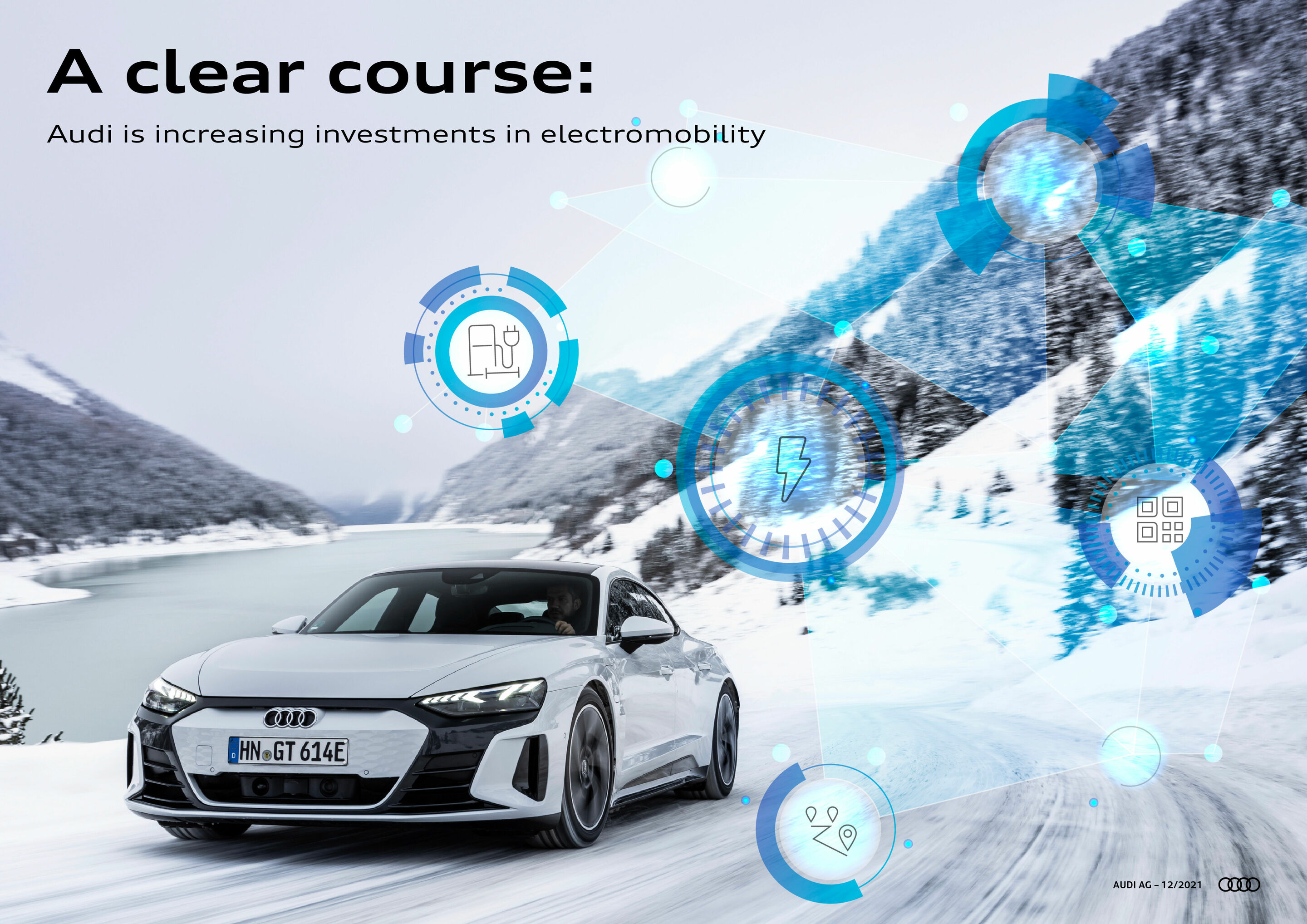A clear course: Audi is increasing investments in electromobility
- The year 2021 characterized entirely by electromobility: Audi doubled the number of fully electric models in its range
- Sum total of advance payments up to 2026 increased to about €37 billion, €18 billion for electrification and hybridization alone
- Charging infrastructure: accelerated expansion of the charging network and a start for the Audi charging hub pilot project in Nuremberg
This year, Audi doubled its product portfolio of purely electric models. With the world premiere of the Audi e-tron GT at the start of the year and the Audi Q4 e-tron in the spring, 2021 was characterized entirely by implementation of the roadmap. Furthermore, with its investment planning for the next five years, Audi is accelerating the transition toward becoming a provider of networked and sustainable premium mobility. In particular, advance payments for future vehicle projects are being increased once again, with a sum total of about €37 billion. The premium manufacturer is earmarking about €18 billion for electrification and hybridization alone and thereby emphasizing its clear commitment to electromobility.
From 2033 on, the future of the Audi brand will be fully electric. The company is continuing to pick up speed along the way: Audi doubled the number of fully electric models in its range in 2021. That means that Audi is putting more electric cars than combustion engines on the market in the current year. With the new models Audi e-tron GT quattro, Audi RS e-tron GT, and the first fully electric models in the compact segment, the Audi Q4 e-tron and Audi Q4 Sportback e-tron, the electric portfolio has grown by four additional models. By 2025, the company aims to have more than 20 fully electric models in its lineup.
Audi is accelerating expansion of its charging infrastructure
With the growing number of electric models, the requirements for the charging infrastructure will also grow. The VW Group is expanding its infrastructure with strong partnerships worldwide. In Nuremberg, Audi is now road testing an urban premium charging concept: the Audi charging hub is addressed to customers without charging options at home and geared toward managing possible future peak demand. The Audi charging hub opens for customers on December 23. The pilot location offers reservable high-power charging (HPC) stations and a directly adjoining lounge area that is available as a premium place to pass the time. Used lithium ion batteries function as energy storage systems, what are known as second-life batteries taken from dismantled development vehicles. Photovoltaic modules on the roof provide additional green energy.
With the Audi charging hub, an additional e-tron Charging Service is going on line. Audi’s own charging service is currently available with about 290.000 charging points in 26 European countries.
For that, the Audi Charging Service turns to IONITY, the largest open high-power charging (HPC) network in Europe. The Volkswagen Group, along with Audi and Porsche, is a founding member of IONITY and has been a joint venture partner from the very beginning. IONITY is investing €700 million in its fast-charging network for electric vehicles in 24 countries. By 2025, the number of high-performance 350 kW charging points will increase from 1,500 currently to about 7,000.
An attractive fast-charging network is a central component of the comprehensive ecosystem that Audi is offering with respect to electric and automatically driven cars and will expand even further in the future.
“Vorsprung 2030”: leading sustainably, socially, and technologically
“The current round of planning reflects our accelerated future trajectory. Based on this investment planning, the focus of our advance payments until 2026 is quite clearly on consistently implementing the roadmap with a comprehensive product offensive of fully and partially electric models,” says Jürgen Rittersberger, Member of the Board of Management for Finance and Legal Affairs. Between 2022 and 2026, the Audi Group is planning research and development as well as investments in property totaling about €37 billion. Consequently, advance payments will increase, particularly for future vehicle projects. The premium manufacturer is earmarking about €18 billion for electrification and hybridization alone and thereby emphasizing a clear commitment to electromobility.
With the corporate “Vorsprung 2030” strategy, Audi has a clear roadmap to lead the way sustainably, socially, and technologically by 2030. “‘Vorsprung 2030’ will ensure that Audi remains viable into the future,” says Audi CEO Markus Duesmann. “The rate of change in our society is rapidly increasing. For that reason, we are accelerating our transformation to climate-neutral mobility. For us, a sustainable business model is quite clearly a matter of approach and responsibility.”Starting in 2026, Audi will only launch new models that are fully electric on the global market. The company will gradually phase out production of its internal combustion engines by 2033. With a clear decision as the result of an intensive strategy process, Audi aspires to continue to grow profitably. Based on market forecasts and its own attractive model portfolio, the company will ship three million cars per year from 2030. With increasing Group synergies, Audi is additionally aiming for a sustainable operating return on sales of more than 11 percent over the long term.
Note to the editors:
The results oft he Audi business year 2021 will be presented at the digital annual press conference 2022 on March 17th, 2022.
